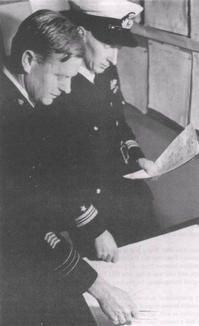


Recollections of Service in the Bureau and RAAF
Foreword
Recollections—Mascot and Rose Bay—the Early Years
Sojourn in the Far East 1942
References
Endnotes
Index
Search
Help
Contact us

A small hydrogen and balloon filling shed came to be erected hard by the meteorological office. Candles in paper lanterns were used in early morning balloon ascents. Carrying out a balloon flight like this was a hazardous operation. Try to imagine what it was like in the dark in a stiff breeze—on one's own. It entailed a careful run across the grass to launch the balloon and lantern, downwind, and then a sprint back to the theodolite for an anxious search in the viewfinder.
It was a blessing when the first Observer arrived to help us handle the work load.
One remembers the arrival of the first brand new DC2 aircraft brought into use by ANA. ANA was the main civil airline—it ran services from Mascot to Archerfield and Essendon using De Haviland aircraft and DC2s. Airlines of Australia (AOA) had a service to Archerfield using Stinsons; Butler Air Transport had services to and from country towns in NSW beginning with Mendooran and Tooraweenah; Adastra Airlines had a service to Bega and carried out aerial photography; there was a service to Adelaide from Mascot via Narranderra and Mildura which I think was an early Ansett service using Lockheed 10s. There were the requirements of the Royal Aero Club of NSW, which included training of RAAF and civil pilots in Tiger Moths; there were defence requirements. Navy forecasts and meteor telegrams for artillery. KNILM, the first international airline flying out of Sydney had just started operating weekly or biweekly to Batavia via ports using the new Lockheed Electras. Mascot provided the route forecast as far as Archerfield.

By early 1939 the Royal Aero Club of NSW undertook initial flying training for the RAAF as well as continuing to train civil pilots.
In 1939 lectures in meteorology were required at the RAAF station at Richmond. These were undertaken by Arthur White, so a couple of times a week a Tiger Moth aircraft and pilot would arrive to take him across to Richmond and back. (The first meteorological office at Richmond would have got underway in early 1941 with vast expansion and conversion to the RAAF Meteorological Service.)
People in Bright Sparcs - Hannay, Alexander Keith (Keith); White, Arthur Charles
 |
Bureau of Meteorology |  |
© Online Edition Australian Science and Technology Heritage Centre and Bureau of Meteorology 2001
Published by Australian Science and Technology Heritage Centre, using the Web Academic Resource Publisher
http://www.austehc.unimelb.edu.au/fam/0345.html